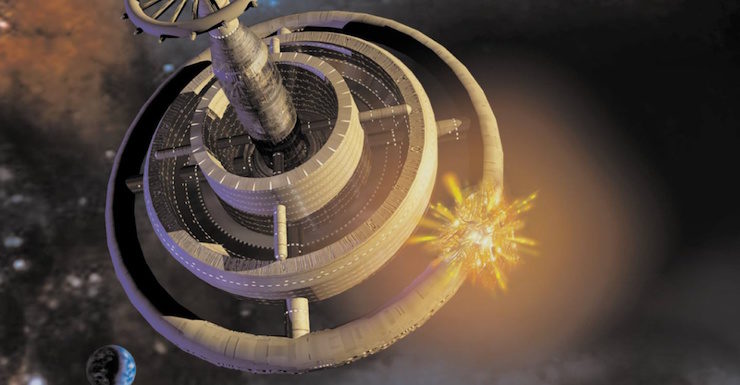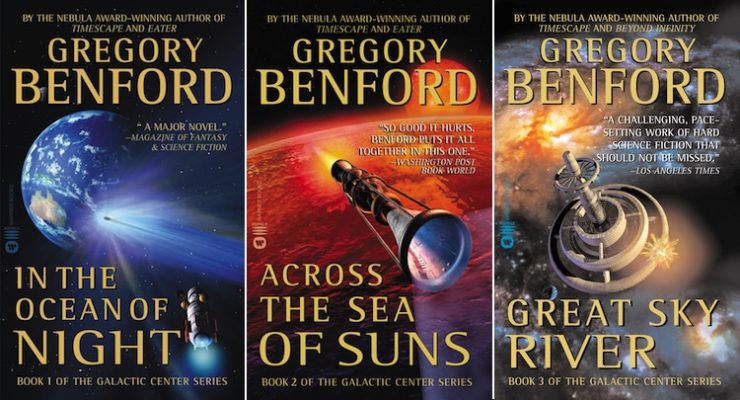In this bi-weekly series reviewing classic science fiction and fantasy books, Alan Brown looks at the front lines and frontiers of the field; books about soldiers and spacers, scientists and engineers, explorers and adventurers. Stories full of what Shakespeare used to refer to as “alarums and excursions”: battles, chases, clashes, and the stuff of excitement.
Some science fiction stories are, well, just more science fiction-y than other tales. The setting is further in the future, the location is further from our own out-of-the-way spiral arm of the galaxy, the protagonists are strange to us, and the antagonists are stranger still. We get a capital-letter, full dose of the SENSE OF WONDER that we love. And when you combine that with a story full of action, adventure, and jeopardy, you get something truly special. If you hadn’t guessed by now, Great Sky River by Gregory Benford, the subject of today’s review, is one of my all time favorite novels for all of these reasons.
Great Sky River was published in 1987, and if I remember correctly, I encountered it the next year in paperback at the local Waldenbooks store. Those days were near the peak of success for Waldenbooks, at the time a major force in the industry with over 1,200 stores in all fifty states, a success that was unfortunately not destined to last for long. The new book superstores were beginning to erode the sales of the Waldenbooks located in shopping malls and strip malls around the country, and then online companies like Amazon began drawing sales away from both the mall stores and superstores. By 2011, Waldenbooks was no more.
Personally, I was at the peak of my fiction reading in those days, consuming at least a book a week on average. I subscribed to Locus, and scanned the upcoming book lists with pen in hand. And there were many to choose from: The book business was pushing out a lot of titles, which stayed on the shelves for shorter and shorter periods, great for readers who wanted a lot of variety. The science fiction field was booming, with a number of books hitting best sellers lists. Some of the greats of the Golden Age, like Heinlein, Asimov, Pohl, Anderson and McCaffrey, were still writing. The cyberpunk genre was emerging and bringing new voices with it. And three younger authors, nicknamed the “Killer B’s”—Gregory Benford, David Brin and Greg Bear—were breathing new life into space opera, with big stories full of lots of science and packed with adventure.
About the Author
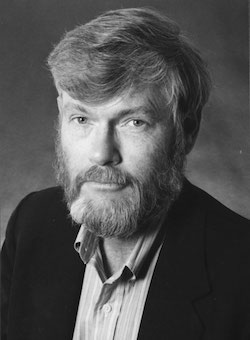 Gregory Benford (born 1941) is one of those rare science fiction authors who is actually a scientist. This shows in his stories, which often feature big, complex ideas and explore advanced scientific concepts. He is a Professor Emeritus at the University of California, Irvine, where he was a physics professor; he has been a member of the faculty since 1971. His fields of study included plasma turbulence and astrophysics. His early involvement with science fiction fandom included publishing the fanzine Void with his twin brother, Jim. Benford’s first science fiction sale was to The Magazine of Fantasy and Science Fiction in 1965. In spite of pursuing a full-time academic career along with his writing, he has been prolific, having written over 30 novels and short story collections. Benford has been nominated for the Hugo Award four times and nominated for the Nebula Award twelve times. He won the Nebula (and the John W. Campbell Memorial Award) for the novel Timescape, and another Nebula for the novelette “If the Stars Are Gods,” written with Gordon Eklund.
Gregory Benford (born 1941) is one of those rare science fiction authors who is actually a scientist. This shows in his stories, which often feature big, complex ideas and explore advanced scientific concepts. He is a Professor Emeritus at the University of California, Irvine, where he was a physics professor; he has been a member of the faculty since 1971. His fields of study included plasma turbulence and astrophysics. His early involvement with science fiction fandom included publishing the fanzine Void with his twin brother, Jim. Benford’s first science fiction sale was to The Magazine of Fantasy and Science Fiction in 1965. In spite of pursuing a full-time academic career along with his writing, he has been prolific, having written over 30 novels and short story collections. Benford has been nominated for the Hugo Award four times and nominated for the Nebula Award twelve times. He won the Nebula (and the John W. Campbell Memorial Award) for the novel Timescape, and another Nebula for the novelette “If the Stars Are Gods,” written with Gordon Eklund.
Among Benford’s most widely known work is a series known as the Galactic Center Saga. The first two books, In the Ocean of Night and Across the Sea of Suns, follow the adventures of British astronaut Nigel Walmsley, who finds evidence of an alien mechanical civilization in a comet that threatens to strike Earth, and then finds remnants of a civilization in a nearby solar system destroyed by the machines, as Earth comes under attack from genetically engineered creatures. The third book, Great Sky River, jumps to the far future, where the Bishop family, heirs to the human race on the planet Snowglade, fight back against invading Mechs. Over the centuries, humanity has been engineered almost beyond recognition with cybernetic augmentation and mechanical implants. The Saga then continues in three more novels, Tides of Light, Furious Gulf, and Sailing Bright Eternity, and a novelette, “A Hunger for the Infinite.”
Benford’s latest works include a pair of books about a massive, solar system-sized spaceship, Bowl of Heaven and Shipstar, co-written with Larry Niven.
Mythical Monsters and Malevolent Machines
Ever since mankind has been telling stories, heroes have been measured by their foes and the challenges they face. The bigger the foe, and the bigger the task, the mightier the hero. In the ancient days of myth and legend, heroes strove against gods and mighty monsters. Take the hero Hercules, for example: the storytellers could have just told us how strong and clever he was, but instead it was better to show us this through the narrative of his twelve labors. As an act of penance, he was tasked to kill or capture a great variety of monsters and beasts, obtain precious objects, and even muck out a massive stable in a single day—and all along he had to contend with the intervention of gods who wanted him to fail. Odysseus is another hero measured by his challenges. In their attempt to return home from the Trojan Wars, he and his crew had to face monsters, storms, trials and temptations. By the time you get to the end of such a multitude of impressive foes and threats, you knew you were reading about truly mighty heroes.
As novels and books began to become more popular and more widely available, writers began to create ever more fanciful and fantastic antagonists and threats, including eldritch horrors, aliens from other planets, and all varieties of natural disasters. They also began to focus on machines as a potential menace. The word “robot” originated in Karel Čapek’s play R.U.R. in 1920, and as quickly as they were named, robots became a staple in science fiction. Even those who saw machines as a boon were worried that the support they provided would sap mankind’s initiative. Isaac Asimov, who spent a large part of his career exploring the positive potential of robots, focused on the limits needed to protect their human masters with his famous “Three Laws.” Others who were less optimistic and looking for a good threat to drive their fiction employed robots as an all-purpose antagonist in their stories. Keith Laumer’s tales of the Bolos, giant autonomous killing machines, were a prime example of robots used as a threat, and movies like The Terminator brought the threat of renegade robots into mainstream popular culture.
In addition to homegrown robotic threats, science fiction was keen to explore the threat of alien machines, created by other races. The most memorable and influential of these were Fred Saberhagen’s Berserker stories, which first appeared in the 1960s. The idea of machines that hated organic life was a popular one, and used in many variations by many different authors. Among these authors is Gregory Benford, whose protagonists face overwhelming threats and challenges that even the heroes of legend would have found daunting.
Great Sky River
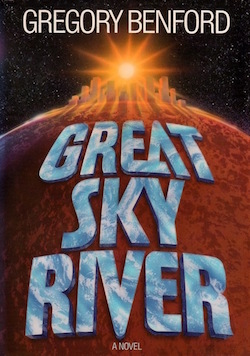 We meet our protagonist Killeen wandering the ruins of the Citadel, destroyed by attacking mechs. He is searching for his father, Abraham, and mourning the loss of his wife, Veronica. Suddenly his friend, Cermo-the-Slow, pulls Killeen’s stim-plug and wakes him up. He has been dreaming again, and drinking too much, and has been doing so obsessively for the six years since the Citadel fell, while the Family Bishop has fled across the surface of the planet Snowglade. Killeen has no father, no wife, no one left that he cares for except his son, Toby.
We meet our protagonist Killeen wandering the ruins of the Citadel, destroyed by attacking mechs. He is searching for his father, Abraham, and mourning the loss of his wife, Veronica. Suddenly his friend, Cermo-the-Slow, pulls Killeen’s stim-plug and wakes him up. He has been dreaming again, and drinking too much, and has been doing so obsessively for the six years since the Citadel fell, while the Family Bishop has fled across the surface of the planet Snowglade. Killeen has no father, no wife, no one left that he cares for except his son, Toby.
Fanny, Captain of the Family Bishop, puts Killeen on point, and he detects some kind of mech pursuing them, possibly one of the dangerous Marauders. It quickly becomes clear that people of his time are heavily augmented with electronic and mechanical enhancements, and use powered suits to aid their movement. Everyone is a warrior in their struggle to survive the mechs spreading across the planet, but the humans are like insignificant vermin to the mechs. Fanny is cut down in a mech attack by something she calls a Mantis, leaving the Family leaderless. In fact, Fanny is not just killed—she is suredead, with her consciousness and memories beyond saving.
The Family takes refuge in a Trough, a mech supply depot, and assess their losses. Killeen and Toby explore, looking for threats, and find an ominous collection of advanced mech parts. The Family begins the process of picking a new leader, and Ledroff, a sour but capable man, emerges as the winner. Killeen, who might have had a chance to lead, gets drunk and misses the vote. The Family finds themselves under surprise attack by navvys, or worker robots—which is unusual—and Killeen destroys the Crafter mech that led them.
Killeen accesses one of his aspects, the recorded memories of ancestors that all adults of the family carry. This aspect, Arthur, a fussy and arrogant personality, helps him read the Crafter’s memory, and find records of an improbably green and verdant area nearby. The Family begins to head toward the area, destroying a mech factory along the way. Killeen also communicates with Bud, one of his “faces”—a less capable aspect, who can translate between humans and mechs. They encounter members of the Family Rook, others who survived the fall of the Citadel, but in the midst of the joyful reunion, the Mantis attacks again, killing dozens of their people.
Toby is injured in the attack, and he and Killeen are aided by Shibo, last survivor of Family Knight, who has been travelling with the Rooks. A slender woman with a full body exoskeleton, she is also very capable, and kills the Mantis with a weapon of her own design. The Mantis is a strange mech, something they have never encountered before, able to use lesser mechs in unusual ways. The survivors move into the green zone, and Killeen begins to bond with Shibo. One night while they are on watch, a strange magnetic storm forms, and the voice of an energy being comes from it, telling them that it orbits the Eater, the gigantic black hole at the Galactic Center around which Snowglade’s star orbits. It tells Killeen not to try to build a Citadel, but instead to ask for the “Argo,” and then fades away before offering any explanation for this cryptic message.
The Families fight off the attack of a Rattler, another mech acting strangely, and survive a cloud of tiny mechs that are part of efforts to reshape the planet’s climate—not an attack, simply a case of being in the wrong place at the wrong time. Following this, they are attacked again by the strange navvys working with the Mantis, and Toby is gravely injured, his legs rendered useless, and one of Killeen’s arms is paralyzed.
Buy the Book
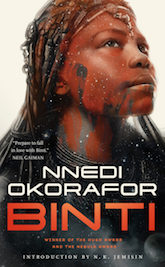

Binti
The two Families then come upon the Family King, whose Captain, Hatchet, has led them in building a crude Citadel in the midst of the green area. Hatchet has reached a truce with the Mantis, which is protecting their outpost in return for the humans raiding other mechs for supplies it needs. The Mantis cannot be killed because it has distributed its mind into multiple mechs—it is a renegade, a mech who has rebelled against the collective consciousness of the mech civilization. Hatchet wants Killeen to come along on a raid because he needs Killeen’s face, Bud, to translate. Killeen does not trust Hatchet, and only agrees to go on the raid if he can take Toby with them, in hopes the facility has the kind of technology needed to heal both Toby’s legs and his own arm; he also insists that Shibo come along as well. I’ll leave the recap there, to prevent spoiling a very exciting ending to the tale.
Benford does a good job of dropping readers into the midst of the action and letting them pick up the details as the plot gallops along, using a distinctive dialect to reinforce the differences between these characters and the people of our era. His portrayal of the mechs and their odd culture feels extremely compelling and real. The human society, which has fallen from great technological heights into reactionary tribalism, also feels like a reasonable reaction and adaptation to the threat of encroaching mechs. Technology and scientific concepts infuse and inform the narrative, but never weigh it down. The story moves briskly throughout, and this is one of those books that you will not want to put down once you start reading.
Killeen is a very fallible hero, and the weight of traumatic stress hangs heavily over him and his companions. His flexible thinking soon begins to set him apart from the others, and is indispensable in facing the ever-changing encounters with the mysterious Mantis. His love of his son, and growing affection for Shibo, give him much-needed motivation to rise above himself, face the challenges of betrayal and shifting loyalties, and strive against impossible odds. The visitation from the energy being offers hints of greater things to come. In the end, measured against the challenges he faces, we see Killeen become a hero whose achievements rank among those of the great mythical heroes of the past.
Final Thoughts
Great Sky River takes us to a dystopian world full of impossible threats and unthinkable horrors—but it is also a world full of adventure and excitement, and Benford blends just enough hope into the proceedings to keep things from getting too grim. The stark contrast between the humans and the mechs leads to some interesting exploration about what it means to be human. The book is complete and satisfying in and of itself, but also open-ended enough to set up a whole series of sequels. In my mind, it ranks among the best books Benford has ever written, and among the best science fiction books of all time.
And now it’s your turn to comment: Have you read Great Sky River, or Benford’s other tales of the Galactic Center? Did you enjoy them as much as I did? And what are your favorite aspects of the stories?
Alan Brown has been a science fiction fan for over five decades, especially fiction that deals with science, military matters, exploration and adventure.










